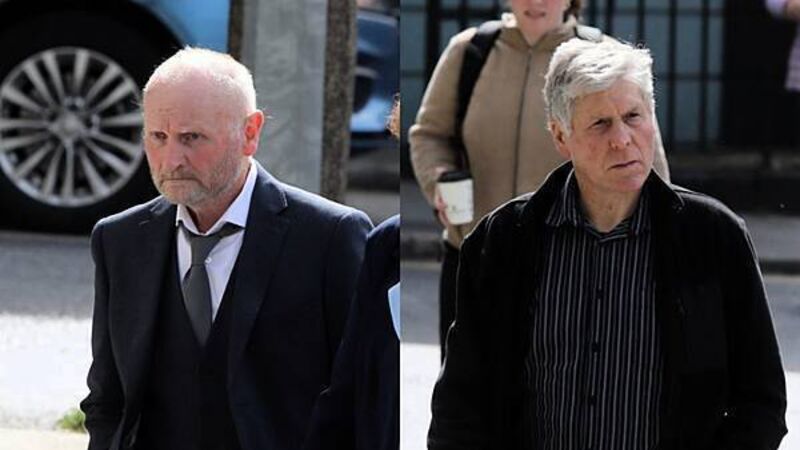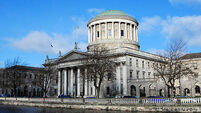Two men fighting extradition linked to RUC murder claim authorities cannot hold cases 'in their back pocket'

Fiona Magennis
Lawyers representing two men wanted in Northern Ireland to face charges relating to the murder of an RUC officer nearly 50 years ago have told the Court of Appeal the authorities cannot hold proceedings "in their back pockets" for decades simply because they feared losing if they pursued the case earlier.
They argued the High Court ought not to have ordered the men’s extradition given that no cogent explanation for the extraordinary delay in the application for surrender had been given.
They said the British authorities had made decisions against extradition - or had failed to make a decision - on numerous occasions over half a century.
They contended the actions of the authorities amounted to an abuse of process.
However, Remy Farrell SC, for the Minister for Justice, argued that in reality this was a “delay case” and the abuse of process label had been applied by lawyers for the two men “to avoid the obvious”.
John Edward McNicholl (73) of Newmills, Letterkenny, Co Donegal and Seamus Christopher O'Kane (74) of Scalestown, Dunshaughlin, Co Meath are wanted in the UK.
They face charges arising from an investigation into the INLA murder of 25-year-old Constable Robert John McPherson in Co Derry on July 26th 1975 and the attempted murder of a second constable.
Mr McNicholl is charged with murdering Constable McPherson and attempted murder while Mr O'Kane is charged with possession of firearms, including an RUC-issued firearm taken during the ambush on Constable McPherson.
Those firearms were recovered in an RUC operation on February 16, 1976 at Garvagh, Co Derry.
Both men escaped from the Maze Prison in a dramatic tunnelling breakout in May 1976 before they could be put on trial.
Mr O'Kane has been living openly in the Meath area for almost five decades while Mr McNicholl, who was deported from the United States, has been in the Republic since 2003.
At the High Court in March of this year, Mr Justice Patrick McGrath said there was no evidence to suggest that Mr McNicholl and Mr O'Kane would not receive a fair trial in Northern Ireland, as he ruled that a delay in serving warrants on the men was not grounds for refusing their surrender to the north.
When the matter came back before the court in June, Mr Justice McGrath ruled that while authorities there have offered a detailed explanation for the delay in seeking the surrender of Mr McNicholl and Mr O'Kane, this was not complete and there have been some "lengthy periods of inaction".
He found that these were cases where an important point of law arose and said it was desirable they be brought before the Court of Appeal.
The judge said the questions to be addressed were whether the lapse of time of 48 years amounted to an abuse of process.
At the Court of Appeal on Friday, Mark Lynham SC, for Mr McNicholl, said there had been a “repeated failure” to seek his client’s surrender over a period of decades.
Mr Lynham said when his client went to America in the 1990s, the Northern Irish authorities were aware he was in the US, and a decision was made not to extradite him.
Mr McNicholl was later deported back to Ireland and at that point “the RUC clearly wanted him and were engaging actively to make that happen”.
“Post 2003 repeatedly there’s consideration given to surrender and no explanation for the lack of it,” said counsel, noting this wasn’t a case that had “slipped under the radar” and “no one knew about it”.
He said Mr McNicholl’s surrender was not sought until 2023, four days before the Legacy Act commenced.
Counsel also asked the court to consider the impact on his client, a man in his 70s, who has built a family life in the intervening years and who is “not in good health”.
He pointed to other extradition cases where, in some instances, eight years after surrender prosecution still hasn’t taken place.
“Given the history of this from 2003, given the complexity of the issues involved surely it raises the issue of unfairness,” said Mr Lynham.
“The question is, is this an abuse of process?” he said. “If it is there must be one remedy which is to strike out proceedings.”
Senior counsel for Mr O’Kane, Sean Guerin, said a decision to prosecute his client for the offences for which he is now sought was first made in June 1976, almost 50 years ago but the first his client “heard of this” was in 2024.
Mr Guerin argued that the delay underlined the “exceptional nature” of what is being sought. He said it wasn’t the delay itself but rather the exceptionality of it.
“It’s a man who learns in 2024 that he’s wanted for offences alleged to have taken place in 1976.”
He said during the late 70s, gardaí were in possession of a warrant seeking his client’s arrest for murder but didn’t proceed with it. He said Mr O’Kane knew nothing of the decision to arrest him for the explosives offence until his recent arrest for the matters before the court.
He contended the Northern Irish authorities made “a strategic decision” not to pursue proceedings “because they were wary of an unfavourable decision” and they then “sat on it for 48 years”.
He said in the intervening years, Mr O’Kane has made a life in Ireland, raised a family here and now, 49 years later, finds the authorities who wanted his extradition had “kept another case in their back pocket” , told no one about it and now want to bring it forward.
“The real test is exceptionality and this is a truly exceptional case,” said Mr Guerin.
In response, Remy Farrell SC, for the Minister for Justice, said the appellants were seeking to take a delay case and “dress it up” as an abuse of process case.
He said explanations had been given by the judicial authority for the delay, accepting that some points of the chronology were “better explained than others”.
“I’m not suggesting the abuse of process has been ousted but one has to look at what has been argued by the applicants. The great portion of what has been argued is about delay,” said Mr Farrell. “In truth this is a delay case. Really the label of abuse of process has been applied to avoid the obvious.”
He said there seemed to be an implication being made that if Mr O’Kane had been surrendered at the time he could have raised the “political argument” and would have succeeded in that. “We say that is speculative,” he said.
Mr Farrell said there was also the question of where the issue should be determined and whether it was for the Irish courts or the Northern Irish courts to deal with.
Mr Justice John Edwards said the three-judge court would reserve judgement.









